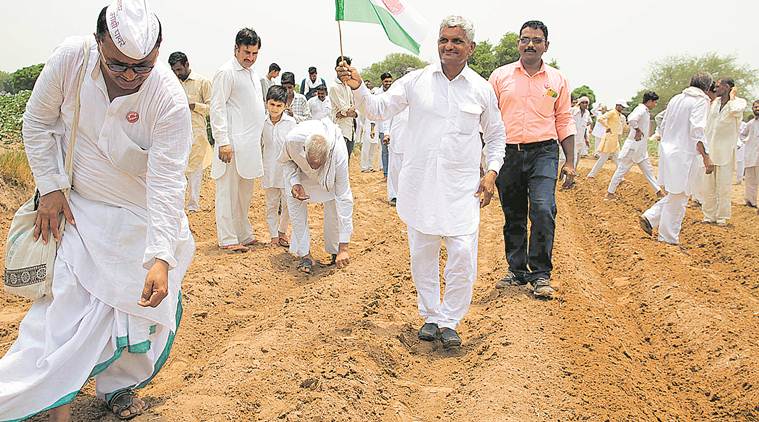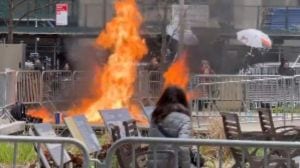- India
- International
Haryana farmers defy govt restriction, sow banned HT Bt cotton in Hisar
As its nomenclature signifies, HT Bt seeds are resistant to herbicides that farmers use to clear weeds without harming the crop.
 Farmers and activist sow HT Bt cotton on a farm in Hisar. (Express Photo: Suresh)
Farmers and activist sow HT Bt cotton on a farm in Hisar. (Express Photo: Suresh)
Some farmers in Haryana Friday symbolically sowed Herbicide Tolerant (HT) Bt cotton seeds at a farm in Hisar district, openly defying the government ban on genetically modified (GM) crop – an act that invites a fine of Rs 1 lakh and five years in jail term. The move was inspired by a similar action by farmers in Maharashtra last month.
In Haryana, the protesting farmers gathered at at the agriculture farm of one Cheeranji Lal Bishnoi, in Hisar’s Sarangpur village. “I am under a debt of Rs 14 lakh and I want to overcome the financial crisis by opting for better seeds,” Bishnoi said.
As its nomenclature signifies, HT Bt seeds are resistant to herbicides that farmers use to clear weeds without harming the crop.
After sowing the seeds, the protesters also distributed it among nearly 200 farmers gathered there. The state unit head of Bharatiya Kisan Union (BKU), Guni Prakash who was present at the spot, said they will now move to other areas in Haryana and to Mansa district in Punjab where “we will not only call the farmers to sow HT Bt cotton but will also prepare BT brinjal plants for distribution.
The Union government in 2010 had imposed a moratorium on BT brinjal.

Also Read | GM cotton: what is allowed, what farmers sowed
Apart from BKU, activists from Maharashtra’s Shetkari Sanghatana also took part in the ‘satyagraha ‘ (civil resistance) demanding that they be allowed to use the latest technologies in the agriculture including GM crops.
“Critics of GM crops say they have adverse impact on health and environment. Why don’t they make such government reports public,” Prakash asked.
The protesters, however, are not sure whether the seeds that they sowed in Bishoni’s farm were HT Bt.
“Because of the ban, government laboratories don’t conduct any test on HT Bt cotton seed. So, it can’t be said with authority that the seeds used belong to the banned variety,” said Lalit Patil Bahale, a farm leader from Akola in Maharashtra.
Bahale had also sown HT Bt cotton on his two-acre field. “Two weeks later, police lodged an FIR against me under various sections of the Indian Penal Code,” he added. Rajender Zoting, another farm activist from Maharashtra’s Yavatmal district, said, “The authorities have collected samples from my fields. I am ready to go to jail for my right to sow the seeds of my choice”.
The protesters also handed over a cheque of Rs 50,000 to Jeevan Saini, a farmer from Fatehabad district in Haryana who had sown the banned BT brinjal on his farm that was later uprooted by the local administration.
A farmer leader from Sirsa, Vikram Pachal said that availability of good seeds was the right of the farmers. “With limited production of mustard, the country is dependent on import of mustard oil, which mostly comes from the Bt crop. No ill effects in the imported have been reported yet,” said Pachal.
According to a statement issued by the activists, nearly 60 per cent of the total area under cotton across world had HT Bt variety. “In 2017, a field survey conducted by the central government had found that in major cotton growing states of Gujarat and Maharashtra, 15 per cent of the total crop sown was HT Bt and in Punjab and Haryana, it was 9 per cent.
Apr 19: Latest News
- 01
- 02
- 03
- 04
- 05






































